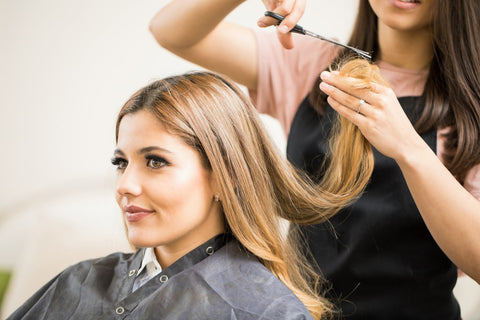You heard the story about Rapunzel and how her hair can magically glow and grow to a tower size. You probably also heard about how you should comb your hair 100 times every day to make it shinier. When we were little kids, we heard plenty of different stories about haircare from our grandma that it was hard for you to decipher which one is true or which one is just a product of their imagination because you believed it so much.
So, we will be busting 10 popular hair myths to see which one has a scientific basis and which one is a total bust. Ready to play fact or cap? Read below...
Fact or Cap: 10 Popular Hair Myths Debunked
Myth #1: Sleeping with wet hair will make you blind

You have probably heard about this popular old tale about how sleeping with wet hair can make you cross-eyed, while some even went far and say it leads to blindness. However, this one is cap.
There is no concrete evidence or scientific basis showing and linking sleeping with wet hair can make you lose sight. Stories about blindness after sleeping with damp hair are just pure coincidental and have no connection to eye problems.
Myth #2: Hair pulled hairstyles can cause baldness

This is not exactly a myth. According to the American Academy of Dermatology (AAD), a constant tight hair pulling can cause permanent hair loss or alopecia. Wearing your hair in a tight bun or ponytail everyday can damage your hair follicles and result in temporary or permanent hair loss.
Wearing your hair up once in a while will not cause permanent damage—just do not do it every day if you do not want to suffer baldness. Also, try to avoid a super tight tug hair bun. Let your hair breathe occasionally and let it down on some days. You may also try a loose up-do to not stress out the hair follicles. Here are some pulled hairstyles you should not be doing everyday:
- Tightly pulled hair bun, up-dos, ponytails, and braids
- Hair weave or extensions
- Also avoid wearing hair rollers to bed every night
Myth #3: Brush your hair 100 times for extra shine

There is some truth to this, but you do not need to count to one hundred times to achieve shiny healthy hair. Hair brushing has different benefits such as stimulating blood flow to the scalp and distributing natural healthy oils from your scalp to the tips of the strands.
However, brushing too much can lead to breakage and hair fall. Over brushing can irritate the scalp and stress your hair follicles. It can often cause friction and damage if done too much. To avoid this, try brushing with a wide tooth comb to detangle coiled hair and gently normally brush only once or twice a day.
If you have a problem with hair loss, however, you might want to brush less frequently. A clinical trial in 2009 evaluated the effect of hair frequency brushing on hair loss. The result showed that hair loss or hair shedding was reduced for those women who brushed their hair less frequently.
Myth #4: Using the same shampoo for years will make it lose its effectiveness

We heard about how our body can build tolerance to one thing if frequently used or consumed. One example would be that some people develop a tolerance to medicines and need a higher prescription because the body has already adapted to the previous dosage. But is this true to shampoo and conditioners too?
The answer is no. Your shampoo and conditioner do not lose its effectiveness overtime if you continue using it. However, you might see some difference to your hair, but this is not because of your shampoo. It may be because your scalp health had changed or that the weather change had affected how your hair reacts to it.
Myth#5: You should not use conditioner if you have oily hair

Oily or greasy hair also needs to use a conditioner. However, it is suggested to apply it only on the end strands and not on the scalp to avoid hair buildup and weigh down the hair.
Conditioners help in hydrating and moisturizing the hair strands, making it more manageable and softer. If you have oily hair, clarify the scalp, and condition the tips.
Myth #6: You do not need to wash your hair, dry shampoo is enough

Whoever said you should not wash your hair probably has tons of hidden dirt built up on their scalp. Dry shampoo can be a quick fix alternative when you do not want to wash your hair everyday, however, it is not a permanent substitute.
Dry shampoo does not clean your hair like normal shampoos do. They absorb oil to make it look less greasy, however, the dirt and buildup will still be on your scalp. You still need to use a clarifying shampoo to scrub away clogged build up on your scalp and maintain your hair healthy.
Myth #7: Plucking gray hair will make it grow two more

If you are seeing gray hairs and someone told you not to pluck it because it will get thicker, spread, and grow back with more gray hair — do not believe it. Gray hair is a result of less production of melanin, a natural pigment that is responsible for adding color to our hair.
Plucking gray hair will not attract more gray hairs but it can cause damage to our hair follicles. Plucking stresses out the follicles that can result in hair loss or less production of hair. If you do not want to damage your hair further, keep the gray hairs and embrace it. You may also try using purple shampoo to tone it down. Try this purple shampoo and conditioner from LxH.
Myth #8: Regularly trimming your hair will make it grow faster

This is one of the most popular myths there is. Regular haircuts will not make your hair grow faster. It can, however, make it look thicker and healthier by removing the split ends that make it look dry and frizzy. If you want to address hair growth, using hair growth products might be more reasonable. Here are some recommendations:
- Pure Biology Premium Hair Growth Shampoo
- Pure Biology Reviva Hair Growth Conditioner
- LxH Biotin and Collagen Gummies
Myth #9: Wearing a hat can thin your hair

Hair experts have suggested that wearing a hat does not really cause your hair to thin. However, hair accessories that are too tight may be a culprit of your hair loss. A constant tugging of hair as said on myth #2 can damage the hair follicles and in turn make your hair shed.
Wearing a hat can help keep our hair safe from the heat of the sun, strong wind, and other external factors that can harm the hair. However, always make sure that it is not too tight on your head and let your hair breathe occasionally.
Myth #10: Hair loss runs on the mother side

Can you inherit your mother’s baldness genes? We often hear that men’s hair loss happens because of the genes of your mother side had a balding tendency. However, the truth is that BOTH parents’ genes are at play with genetic baldness.
Your father’s side may also contribute to these genetics play and give you an early balding problem. So next time you see your mom, make sure not to blame her and her side of the family for giving you a receding hairline!
Sources:
Hairstyles that pull can lead to hair loss. (2014). Aad.org. https://www.aad.org/public/diseases/hair-loss/causes/hairstyles#:~:text=The%20constant%20pulling%20can%20cause,you%20develop%20permanent%20hair%20loss.
Kiderman, A., Gur, I., & Ever-Hadani, P. (2009). The effect of brushing on hair loss in women. Journal of Dermatological Treatment, 20(3), 152–155. https://doi.org/10.1080/09546630802512661
